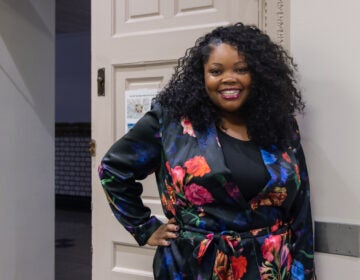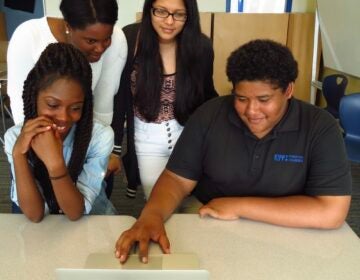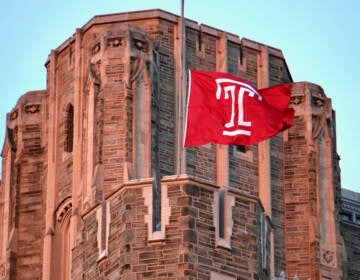Philly City Council passes law to help student athletes navigate financial deals
The city will partner with Temple University School of Law to help high school and college athletes navigate NIL deals by providing free legal and financial advice.
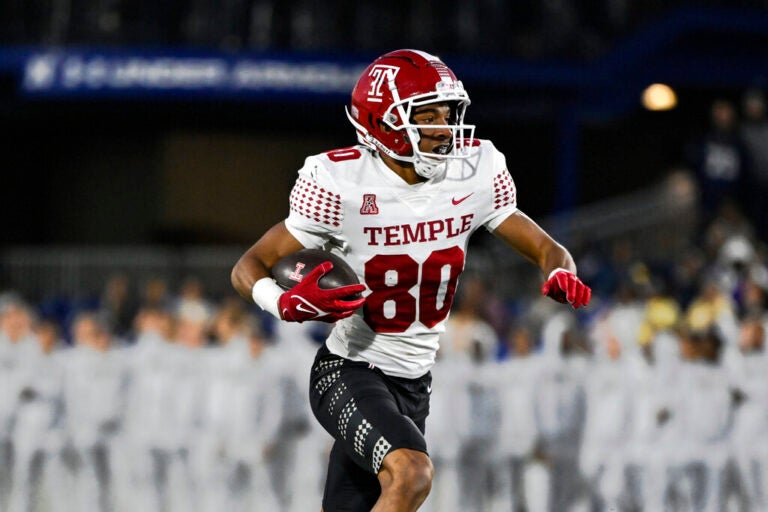
File photo: Temple wide receiver Zae Baines (80) runs with the ball after making a catch during the second half of an NCAA college football game against Navy, Saturday, Oct. 29, 2022, in Annapolis, Md. Thanks to a new law passed by Philadelphia City Council, the city could partner with Temple University School of Law to help high school and college athletes navigate and monetize NIL deals, with free legal and financial advice. (AP Photo/Terrance Williams)
From Philly and the Pa. suburbs to South Jersey and Delaware, what would you like WHYY News to cover? Let us know!
Colleges have long raked in billions from student athletes’ sweat and talent as the players themselves never saw a cent. A recent rule change means that students can finally cash in on their own names, images or likenesses, known in its abbreviated acronym as NIL.
In 2021, the National Collegiate Athletic Association altered its rules to permit the change. Student athletes previously were prohibited from earning any profits under the threat of losing college eligibility.
On Thursday, Philadelphia City Council passed a law introduced by Councilmember-at-Large Isaiah Thomas. The city will partner with Temple University School of Law to help high school and college athletes navigate and monetize NIL deals, with free legal and financial advice.
The bill goes now to the desk of Mayor Cherelle Parker.
“I think it’s good for the student athletes, who were exploited for too long by colleges and universities who made money off the backs of these student athletes,” said Ken Jacobsen, a law professor and director of Temple University’s Sports Law Program. “But the problem is with that, with the change, there came a surge of conflicting rules, conflicting laws, conflicting regulations on the college level, as well as on the high school level.”
The partnership has a hotline for parents and students run by Temple law students: 215-204-SPTS (7787). Organizers have also created easy-to-understand materials explaining NIL guidelines.
Typically, an NIL deal can be a sponsorship outside of the school in which an athlete endorses a brand, product or service, or the brand or service might appear on the athlete’s social media platforms. Some colleges also pay a percentage of the merchandise sales that features a student’s image, likeness or name.
Thomas, who also coaches basketball at Sankofa Freedom Academy in Kensington, first introduced the legislation last year, when it passed Council only to be vetoed by former Mayor Jim Kenney. Earlier this year, Thomas re-introduced the legislation and it passed Thursday.
“We are here today to step up for student athletes. NIL deals are happening,” Thomas said. “But we are not allowed to participate in the deals, so when a young person has questions about NIL deals, they can’t call Coach Thomas to get access or support, financial advice or how much taxes to pay.”
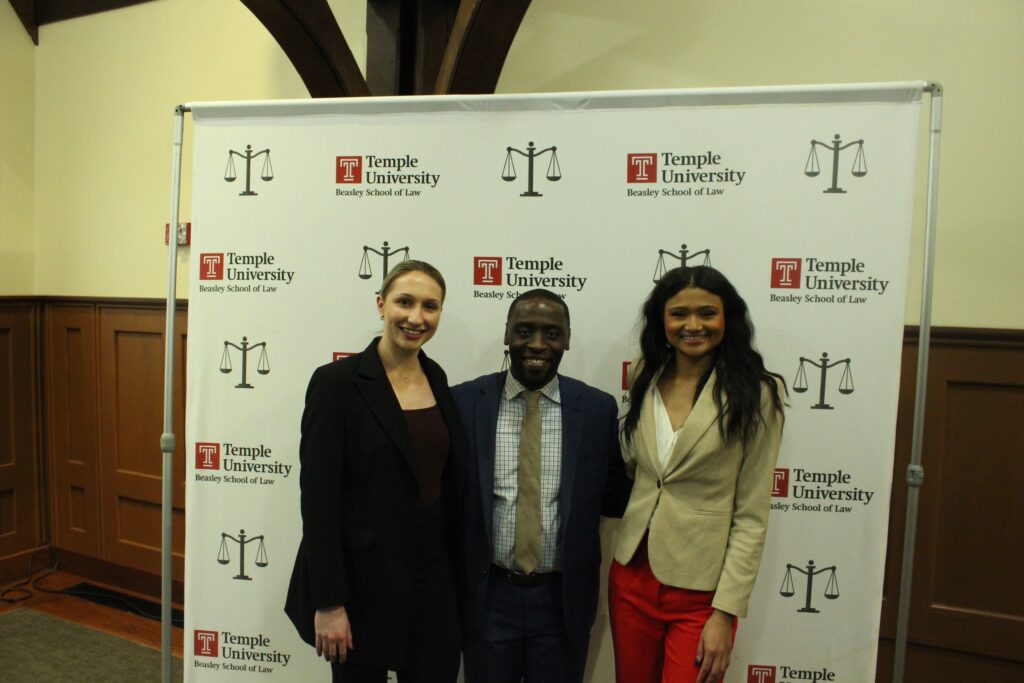
But Thomas and Jacobsen point out potential pitfalls, including a possible loss of eligibility, voiding of championships or dealing with unscrupulous business people.
“Where there is money, there are bad actors,” Jacobsen said.
For example, he pointed to cases where athletes were deceived into taking on predatory loans disguised as NIL deals; or a naive youngster might be enticed to sign a deal that turns over the rights to their NIL in perpetuity.
In addition, Jacobsen said, NCAA rules are very different from those of the Pennsylvania Interscholastic Athletic Association, the governing body for high school athletics.
Michael Horsey, managing partner of Horsey, Buckler & Heffler accounting firm in Philadelphia, said students also must take into consideration tax liabilities on any deal.
In 2023, the firm, which specializes in NIL deals for professional and student athletes, opened HBH Sports Division to help them with tax, advisory and other services.
The NCAA rule change came after a number of court cases, including the Supreme Court, have lifted restrictions on financial benefits for college athletes, which led states to follow suit.
“Name, image and likeness, what is it? It’s our face, our name, our persona,” Jacobsen said.
Meanwhile, the NIL deals are part of an evolving definition of student athletes.
This week, the Dartmouth College men’s basketball team voted to unionize and affiliate itself with the Service Employees International Union Local 560, which represents other workers at the school.
In 2021, the National Labor Relations Board ruled that college athletes are employees under the National Labor Relations Act.
Last year, the NCAA made $1.3 billion, much of it in the form of lucrative television contracts for basketball and football, along with merchandise sales, according to USA Today.
On3NIL is a website that tracks NIL deals and creates an annual value for athletes based on a formula that includes the value of the deals, social media following and other factors.
The top 10 NIL earners listed on the website are some of the most well-known college athletes, including Bronny James, NBA superstar LeBron James’ son, who ranks No.1 at $5 million a year and plays college basketball at the University of Southern California. Caitlin Clark, who is ranked No. 4 at $3.1 million a year, plays women’s basketball at Iowa University. This week she broke the late “Pistol” Pete Maverich’s all-time NCAA scoring record. Angel Reese plays women’s basketball at Louisiana State University and ranks No. 8, at $1.7 million a year.
“This partnership hopefully will put us in a position to fill the void and see NIL deals at the collegiate level, but even at that level it is still uncharted territory,” Thomas said. “So imagine how lost we are as it relates to high school amateur athletics.”
About 20% of the families in Philadelphia live below the poverty line and likely would find affording a lawyer difficult, Thomas said. Families with income of less than $150,000 a year will be eligible to participate.
“Temple law students love this city and will be heavily invested in this program,” said Khaaliq Van, a Temple law student who is part of the program. “We commit ourselves to helping Philadelphia residents.”
Meanwhile, Jaaliyah Evans and Olivia Vance, who play on Temple’s women’s volleyball team, are among the Temple athletes who have scored NIL deals and support this effort to help others.
“We first started listening to this idea and we were just super excited about it,” Evans said.
“A resource like this is something that is so valuable,” Vance said.

Saturdays just got more interesting.
WHYY is your source for fact-based, in-depth journalism and information. As a nonprofit organization, we rely on financial support from readers like you. Please give today.



